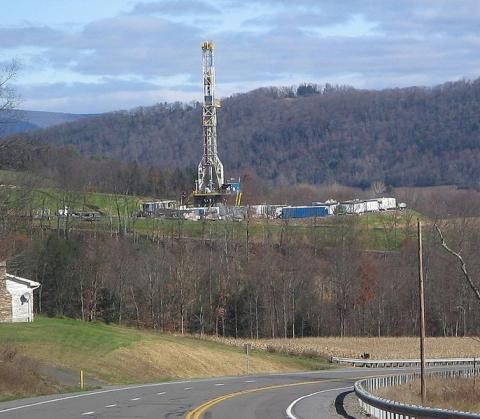
ProPublica, whose reporter Abrahm Lustgarten is currently one of the most prominent critics of hydrofracking in the media, published a long piece yesterday that casts doubt on the purported climate benefits of natural gas. An excerpt:
Advocates for natural gas routinely assert that it produces 50 percent less greenhouse gases than coal and is a significant step toward a greener energy future. But those assumptions are based on emissions from the tailpipe or smokestack and don’t account for the methane and other pollution emitted when gas is extracted and piped to power plants and other customers.
The EPA’s new analysis doubles its previous estimates for the amount of methane gas that leaks from loose pipe fittings and is vented from gas wells, drastically changing the picture of the nation’s emissions that the agency painted as recently as April. Calculations for some gas-field emissions jumped by several hundred percent. Methane levels from the hydraulic fracturing of shale gas were 9,000 times higher than previously reported.
In addition to new studies from the EPA, Lustgarten's story leans on Cornell professor Robert Howarth, who is currently engaged in an ongoing reserach project to measure emissions from various fossil fuels over their entire lifecycle (meaning, not just the emissions you get from burning the fuel, but also those involved with extraction, transport, etc.).
Based on his research (which, he notes, is still a work in progress), Howarth believes the greenhouse gas emissions associated with natural gas have been vastly underestimated, and that natural gas is potentially on a par with coal in terms of climate impacts. We spoke with Howarth last spring, when he released a preliminary paper on his findings. Here's an excerpt:
WP: You set out to compare the carbon emissions of natural gas to coal and oil. What did you find?
RH: If you look at the Department of Energy's analyses of greenhouse gas emissions from those three fuels, they will say gas is the cleanest and coal is the dirtiest. But that's based on the emissions just from combustion. Energy for digging the pipeline, laying the pipe, trucking the water, hydraulic fracturing, dealing with the waste—those all emit greenhouse gases.
But most important is the release of methane gas. It's hard not to have a little bit of gas leakage when you move stuff over a long distance via a pipeline. The EPA's most recent estimate is 1.5 percent leakage. That's a conservative estimate. We're working on coming up with a better number—and it's going to be higher, frankly.
Reacting to the ProPublica piece in the New York Times's Dot Earth blog yesterday, Andrew Revkin -- a well-known and widely-read environmental and climate reporter -- argues that methane leaks or no, natural gas is still a less risky fuel than coal, and needs to be part of our national energy strategy.
I agree with Christopher Helman over at Forbes who recently wrote that low gas prices mean there’s little to lose by holding up drilling in highly contested areas (the Marcellus Shale here in New York being the prime battle zone) while the E.P.A. review is completed.
But campaigners who fight natural gas altogether, like anyone else immersed in the struggle over an energy policy that works for the long haul, would do well to come up with a real-world game plan for supply sufficient energy to foster human progress while limiting environmental risks.
Otherwise, they’ve moved from the Nimby camp to the world of the Banana (build absolutely nothing anywhere near anything).
Photo of Marcellus rig in Lycoming County, PA. From Wikimedia Commons.












